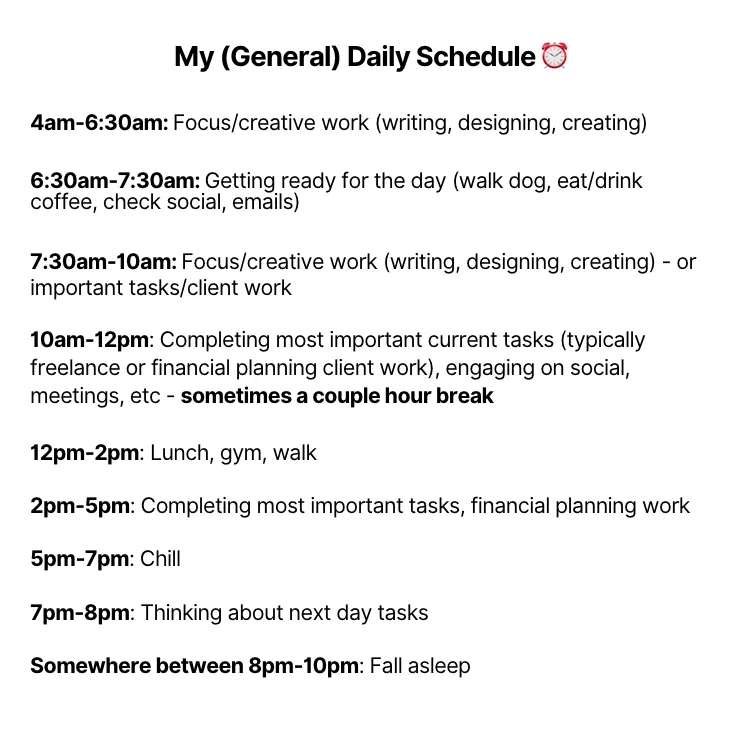There are a million different productivity hacks out there and just as many “gurus” teaching them.
Truth is, most aren’t realistic and a vast majority flat out don’t work.
We love the idea that a 5-step process could help us accomplish our goals & do more with our day but in reality, life gets in the way and we fall back to our standard way of living.
But that’s why you have to take a different approach.
One that matches your lifestyle.
I’m going to share the “principles” for how I structure my day, and how you can create your own daily flow:
From my experience, you need at least one uninterrupted hour during the day to make real progress in what you’re working on.
For me, this comes at about 4am. I don’t set an alarm for it, my natural state of anxiety just doesn’t let me sleep that well..
But that’s an important point - you need to find what fits your schedule.
I know that 4am isn’t manageable for most people. But you can find a set time throughout the day in your schedule to sit down & work if you’re committed to your craft. If I didn’t wake up early, my focus time would probably be around 6pm (like it was when I had a full-time job).
But during this time, I do most of my creative work. This usually consists of writing, designing, or once in awhile, catching up on replies & emails.
The important part is structuring your day in a way that gives you some undivided attention towards your work.
I can’t put a finger on it, but I think this is the biggest reason that I’m able to get a lot done. I work from home and I live by myself, so the internet and my own brain are my biggest distractions.
✅ I promise that an hour or two of “deep” work will do more for you than 8 hours of distracted work.
Further reading: The Complete Guide to Deep Work
To “feel” productive, it’s easy to stack your to-do list with menial tasks.
I do it too.
But to get things done, you need to know what’s important & what gets you closer to your goals.
For a freelancer, this is most likely doing client work, doing sales/outreach to get more clients, or refining current skills & processes.
For a YouTuber, this could be recording the next video, writing a script, editing, or engaging with their community.
Point is, you need to define what’s important to your creative business, what helps it grow, what you enjoy - and then spend a majority of your time on those things.
For me, the most important things I need to get done are writing articles like this, publishing my weekly newsletter, servicing clients, doing marketing & social media, and building relationships with other creatives.
(As you’ll see in my typical daily schedule at the end of this post, most of my day is blocked off to give me time in these areas)
To me, time blocking feels like the only way to go about a work day.
If you jump back and forth between tasks all day, you'll never make progress due to the harmful effects of context switching.
I take a simple approach:
I don't know about you, but I can't get things done unless there's a deadline. For example, I'm writing this article on Saturday morning, 2 hours before it goes out in the newsletter.
I wish I could fix my brain. I really do. But I don't know how, so I design my days to work with it.
For projects or tasks that don't require a hard deadline, I create "checkpoints" for myself throughout the project to act as deadlines. I'll use a time block to (hopefully) reach a certain checkpoint, and that's helped a lot with working through bigger tasks.
For the first year or so, I thought I had to work every hour of every day to be successful.
I was wildly wrong..
Real progress is made when you have the energy to tackle the biggest tasks within your business. For example, I can power through a lot of monotonous tasks when I'm tired, but the impactful things don't get done.
Don't fall victim to hustle culture.
You need to work hard, but you need to rest just as much - especially as a creative.
One mental framework that helps me manage my week-to-week and month-to-month expectations is the ideas of "seasons".
There may be a period of time where you really do need to work 50+ hour weeks to finish a project or meet deadlines. But once that "season" is over, you may transition into 20 hour weeks for awhile because you earned enough to take on less work.
In other words, everything is temporary and you're in control of your efforts.
If you need a break, take it. If you have energy, get as much done as you can.

Takeaways & Notes
